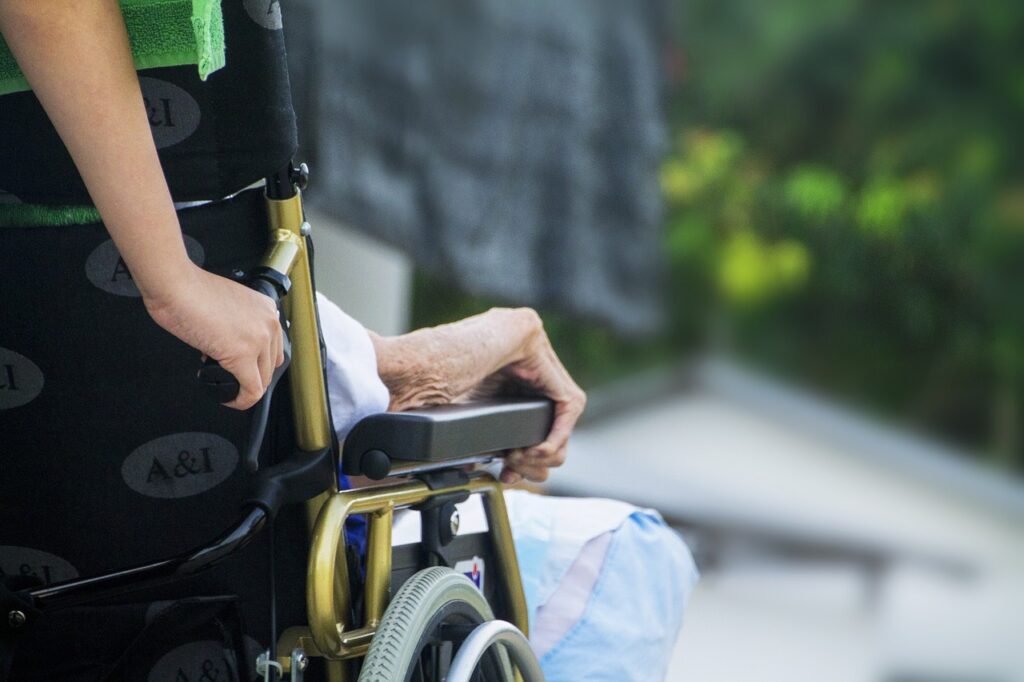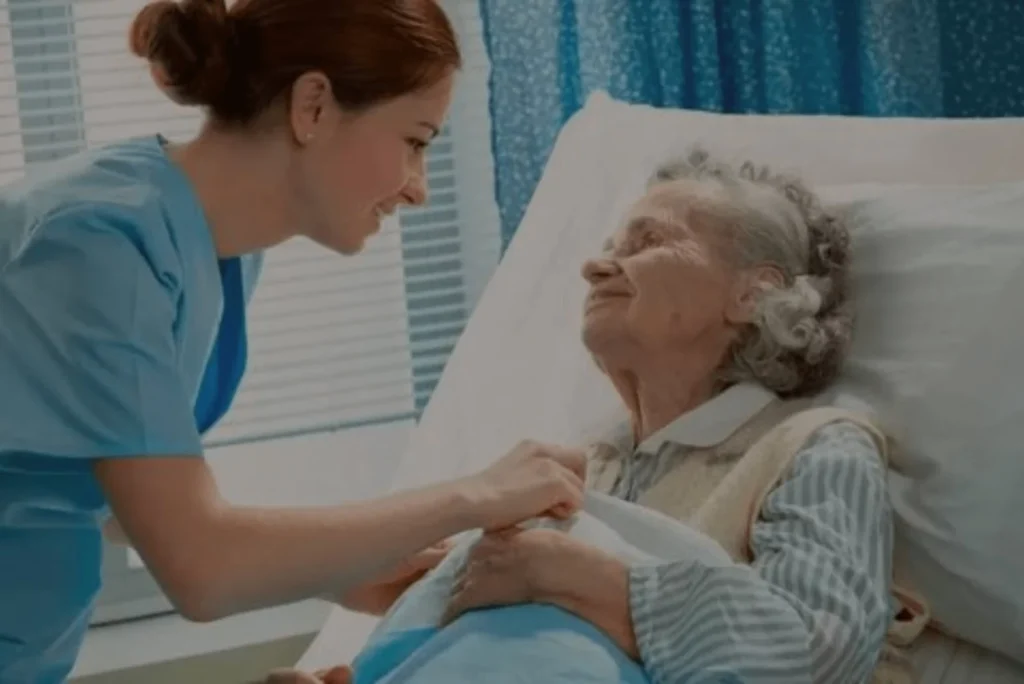Does Hospice Care Mean Death? Actual Truth About Hospice Care
Choosing hospice care is no wonder a difficult process for the patients as well as their families. It is essential to consider the improvement of the quality of life of patients and value their preferences.
Opting for hospice care may make patients and families wonder if this is the end of their lives. This article aims to explore certain aspects of hospice care and how patients can benefit from it, medically and nonmedically.
No, hospice care does not mean death. Hospice care is a service provided to people with incurable diseases or illnesses. One major myth about hospice care is that the person receiving it is expected to pass away in less than 6 months, which is not true. Families may consequently tend to give up on their loved ones.
If you’re looking for the best Hospice Care Services in Florida, check Caring Hands Home Care out!
How is Hospice Care Different from Traditional Medical Care?
While medical care focuses on approaching care in medical ways, hospice care mainly improves the comfort and quality of life of patients with terminal illnesses. Medical and hospice care may differentiate from each other in the following ways
Holistic Approach
Traditional medical care mainly focuses on treating an illness or disease through a medical approach. However, hospice care considers all aspects including the emotional, psychological, and social well-being of the patient.
Moreover, the physical needs of the patients are also addressed, considering the individual needs of each patient.


Care Duration
Traditional medical care can be ongoing, aiming to extend the duration of life through medical approaches. However, hospice care is more about providing comfort for 6 months for patients with illnesses considered incurable.
Setting of Care
Traditional medical care is typically provided in a hospital. However, hospice care can be provided in various settings, including the patient’s home, care facilities, or nursing homes.
In hospice care, patients have the option to choose a setting they find comfort in most, which is not quite the situation in traditional medical care.
Treatment Intensity
Many aggressive treatments such as chemotherapy and surgeries are provided in traditional medical care. However, in hospice care, the treatment usually includes a care plan that focuses on minimizing invasive procedures and avoids inducing discomfort for the patients.
Care Team
The care team in traditional medical care may include physicians or healthcare professionals. However, in the case of hospice care, treatment is usually provided by nurses, social workers, or volunteers.


With a collaborative approach, they focus on improving the comfort and quality of life of individuals receiving hospice care.
Focus on Comfort and Quality of Life
The main focus of hospice care is to provide comfort to the patients through pain and symptom management. While, for medical care, the focus is to extend the life duration through aggressive treatments.
What are the Goals of Hospice Care?
While hospice care mainly emphasizes providing the utmost care and support to patients, the following are some of the goals of hospice care.
Pain and Symptom Management
Hospice care focuses on various management techniques to minimize pain. Moreover, distressing symptoms are also managed to ensure the quality of care and support provided.
The focus is to eliminate or reduce any painful stimulus to provide patients with a comfortable environment.
Respecting Individual Wishes
Hospice care makes sure to include patients in their care process. Thorough communication is ensured to involve patients in the decision-making process. Moreover, the treatment plan is tailored according to the needs of every individual.
Creating a Comfortable Environment
Hospice care provides a peaceful and supportive environment to patients receiving hospice care. Whether the care is provided in the setting of the patient’s home or the surroundings of a care facility, comfort and dignity are promoted in either case.


Promoting Meaningful Interactions
The care team promotes social interactions with the patient. Meaningful conversations, interactions, and closure between the patient and their loved ones are ensured to provide patients with a quality of life.
Enhancing Quality of Life
By addressing the emotional, social, physical, and spiritual needs of the patient, hospice care significantly enhances the quality of life. Rather than curative measures, hospice care provides a high standard of care and necessary support. It ensures the comfort and dignity of patients and makes this difficult journey a little easier.
Who Receives Hospice Care?
Individuals who have been diagnosed with a terminal disease or an incurable illness can receive hospice care for 6 months or less. Patients who may receive hospice care include the following
Patients with Advanced Illnesses
Patients who are diagnosed with an advanced stage of illnesses such as cancer, lung disease, kidney failure, or heart disease can seek hospice care.
Patients no Longer Seeking Curative Treatments
Individuals who no longer want aggressive treatments and curative intervention can seek hospice care. For such patients, hospice care may be the best option as they prefer comfort and peace.
Patients with Prognosis of Six Months or Less
Hospice care can be provided to patients if based on their disease progression, a healthcare provider determines life expectancy to be 6 months or less.
Patients with Palliative Care Needs
Patients seeking a holistic approach to care, including emotional, social, and psychological aspects can opt for hospice care for themselves and their families.
Patients Seeking Comfort-Oriented Care
Patients who prefer a comfortable care process rather than medical treatments and interventions that produce discomfort may choose hospice care.
At What Stage of Illness Is Hospice Care Provided?
Hospice care is typically provided in the late stages of an incurable illness. When the treatments are no longer curative and the disease has progressed so far, patients may receive hospice care.
However, it is essential to understand that hospice care is not solely determined by the stage of illness, the prognosis and individual comfort are also considered.


Determining the right time for hospice care requires open-ended communication between patient, their families, and healthcare professionals. It’s a sensitive and personal choice that reflects the patient’s desires and preferences and should be considered before generating a care plan for the patient.
Medical Services Included in Hospice Care
Hospice care provides a number of medical services to provide a high standard of care for patients. Some of the medical services provided are given below.
Medication Management
Hospice care provides assistance in managing medication. The care team ensures the proper consumption of medicines timely and addresses any potential side effects of a medicine to prevent any adverse consequences.
Pain and Symptom Management
Specialized care also focuses on managing pain and symptoms to ensure the comfort of patients. The care team can address any issue through medications, therapies, or other intervention techniques.
Medical Equipment and Supplies
Depending on the setting, many medical supplies are provided to patients to increase their level of comfort. Wheelchairs, hospital beds, or oxygen supplies can be provided to ensure an enhancement in the ease of care.
Therapies
Depending on the condition or illness, certain therapies can be provided to patients receiving hospice care. These therapies may include physical therapy, occupational therapy, or speech therapy to improve the quality of life of patients.
Is Emotional Support Provided in Hospice Care?
Yes, hospice care also provides emotional support to the patients. The key is to identify the emotional challenges an individual may be encountering and address them to increase the quality of life of individuals. Some key aspects of hospice care include the following
Counselling Services
In hospice care, counselors or social workers may provide patients and their families with a safe space to discuss their concerns. They can discuss any concern that bothers them such as their anxieties, fears, or emotional concerns regarding their illness or disease.
Spiritual Support
Hospice care respects the diversity of patients and provides chaplain services or religious support to religious patients. Respecting the individual’s unique beliefs and preferences, hospice care may provide spiritual guidance, religious rituals, or companionship. This can significantly provide patients with peace of mind and a sense of satisfaction.


Compassionate Listening
The hospice care staff is trained enough to provide patients with compassionate care as well as emotional presence. With compassionate listening, the care team can provide the patients and their families with comfort and understanding to navigate through this tough journey.
Grief and Bereavement Support
Hospice care extends its services to families as well. Beyond the passing of the patient, hospice care provides bereavement support to families and loved ones. This may include counseling or support groups to help the families through the grieving process.
Promoting Meaningful Conversations
Hospice care encourages open discussions regarding end-of-life preferences. The care facility helps the patients and their families in exploring or expressing their concerns, wishes, and fears.
These meaningful and healing conversations are a way to provide patients with a sense of independence and security to make the care process a little easier.
Does Hospice Care Include Services for the Families as well?
Yes, the care services are not only limited to the patients but families and caregivers can also benefit from these services. Following are some of the services provided to the families.
Psychological Support
Having a loved one go through a terminal illness is no doubt a frustrating and distressing situation. In these tough times, hospice care makes sure to provide psychological care through counseling, guidance, or emotional support to the families as well.
Education and Guidance
The hospice team educates and guides the families regarding the condition and illnesses of their loved ones. This enables families to provide effective support, once they understand the conditions and symptoms of the patient.
Respite Care
Respite Care provides families with a break from the caregiving process to attend to their personal needs. Consistent caregiving can cause burnout and hospice care makes sure to provide patients with the utmost care and support, while also preventing caregiver burnout in families.


Decision-Making Support
Hospice care encourages the involvement of families in the care process. Through open communication, families can feel free to share their concerns and actively participate in the decision-making process to ensure the well-being of their loved ones.
Bereavement Support
After the patient’s passing, hospice care provides a bereavement program to the families. These support programs are designed to provide support and counseling to help families navigate through tough times.
Conclusion
The concept of hospice care is often misunderstood and associated with death. Whereas, hospice care is mainly about providing care and support to patients to help improve their quality of life and overall well-being.
While choosing hospice care may be a difficult decision for families, it is essential to opt for the best one to provide your loved ones with the support they require to help them through the difficult phase of life.
Through providing emotional, social, physical, and spiritual support to patients, the journey toward the end of life can be made quite easier.
FAQs
Can patients in hospice care receive medical treatments for their illnesses?
Yes, medical care such as pain and symptom management can be provided. However, curative treatments are no longer pursued in hospice care.
Can individuals leave hospice care if the condition improves?
Yes, individuals can leave if the condition improves. If the patient wishes to continue curative treatments, they can leave hospice care as well.
Is hospice care only for elderly patients?
No, hospice care is not limited to any age group. Any individual with a prognosis of 6 months or less, regardless of their age can seek hospice care.
Is hospice care covered by medical insurance?
Yes, hospice care is usually covered by Medicare or Medicaid.
Is hospice care the same as palliative care?
No, while hospice care is usually for patients with a prognosis of 6 months or less, palliative care can be provided at any stage of illness and can accompany curative treatments.


![Does Hospice Cover 24-Hour Care At Home? [Agency Guide]](https://caringhandshomecarefl.com/blog/wp-content/uploads/2024/02/Does-Hospice-Cover-24-Hour-Care-At-Home-768x433.png)
![What Are The Four Levels Of Hospice Care? [EXPLAINED]](https://caringhandshomecarefl.com/blog/wp-content/uploads/2023/11/hospice-1750928_1280-768x512.jpg)